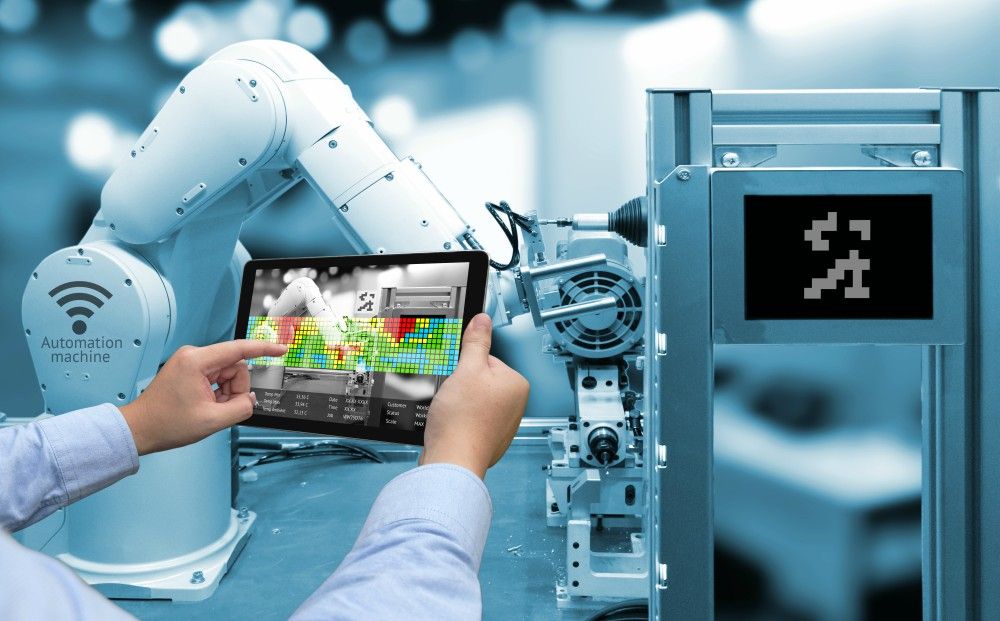Smart factories will drive a 27% increase in manufacturing efficiency over the next five years

Smart factories which use collaborative robots, automation and predictive maintenance, will act as the catalyst for a new global economy across manufacturing, engineering and technology industries.
Capgemini, the consulting, technology and outsourcing service, has today announced the findings of its smart factories report 'Embracing Digital Technology'. According to the research, manufacturers expect that their investments in smart factories will drive a 27% increase in manufacturing efficiency over the next five years, which would add $500 billion in annual added value to the global economy.
Smart factories leverage digital technologies, such as big data, analytics, artificial intelligence (AI), advanced robotics and the Internet of Things (IoT) to increase productivity, quality and flexibility in the manufacturing industry.
Smart factory features include collaborative robots, workers using augmented reality components and machines that send alerts when they need maintenance. By the end of 2022, manufacturers expect 21% of their plants will be smart factories. Sectors such as aerospace and defence, industrial manufacturing and automotive, where people are working alongside intelligent machines, are predicted to be the leaders of this transition.
Organisations in the US and Western Europe have so far been early adopters, as half of respondents in the US, France, Germany and the UK have already implemented smart factories compared to just 28 and 25 percent in India and China respectively.
Tom Drew, Manufacturing & Operations Consultant at Redline Group comments: “This study makes it clear that we are now in the digital industrial revolution. The impact on overall efficiency will be profound and the next few years will be critical as manufacturers look to improve their digital capabilities and accelerate their digital outcomes to maximise their company benefits. There will also be a knock-on effect on manufacturing jobs as with mass digitalisation will affect any worker’s skillsets which can quickly become outdated."
“A recent example of automation in the technology industry was announced at the beginning of May 2017 with ABB and IBM’s Strategic Collaboration which will bring together ABB’s digital offering and ABB Ability, with IBM Watson’s cognitive capabilities in an attempt to serve customers in utilities, industry, transport and infrastructure. The first two joint industry solutions powered by ABB Ability and Watson are intended to bring real-time cognitive insights to the factory floor and smart grids. This powerful combination marks the next level of industrial technology, moving beyond current connected systems that simply gather data, to industrial operations and machines that use data to sense, analyse, optimise and take actions that drive greater uptime, speed and yield for their industrial customers.”
Tom continues: “As specialist technology, engineering and manufacturing recruiters, we understand the evolutions in machine learning will require a shake-up of learning new skills to ensure people have the right skills to get the most out of a world gradually embracing automation. The shift to smart factories will transform the global labour market, and while previous waves of automation have reduced low-skill jobs, organisations have recognised new skills are imperative and are now acting on this ‘skills imperative’. Automation can remove inefficiencies and overheads, rather than jobs. For highly skilled workers in areas such as automation, analytics, and cyber security, there will be even more employment opportunities.”
“With the ‘skills gap’ continuing to become widespread in areas such as manufacturing, engineering, and technology, it is more notably rising in areas such as data science and cloud computing jobs.”
“At Redline we continue to act on the ‘skills imperative’ and regularly have conversations and updates from our manufacturing clients on what they are doing to invest in digital talent acquisition to ensure they are bridging the gap. We encourage businesses to focus on enabling their employees to work with machines rather than replace workers. Some of our clients use smart robots where there are ergonomic issues which ultimately creates a safer environment for workers. However, employees should be encouraging collaboration amongst automated machinery and employees."
To find out more about manufacturing and operations jobs, quality jobs, procurement jobs and careers in purchasing and supply chain, or to see our latest job opportunities, please click here or alternatively contact Tom Drew on 01582 878848 or email TDrew@RedlineGroup.com

